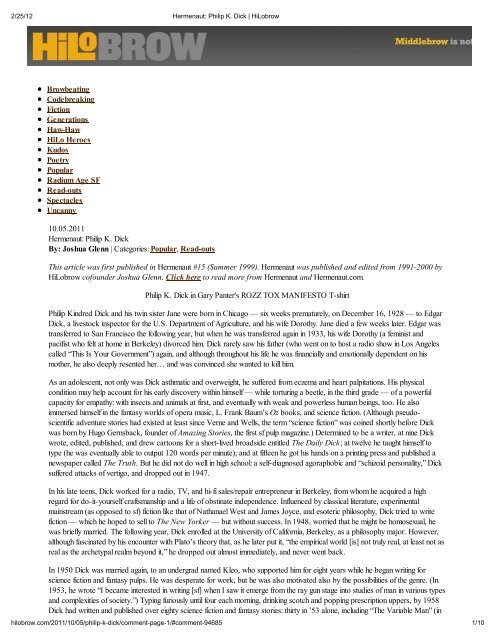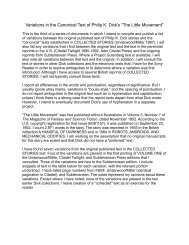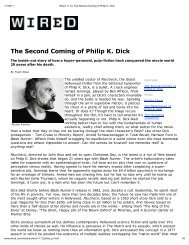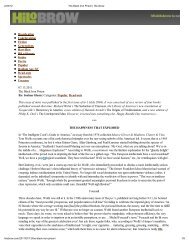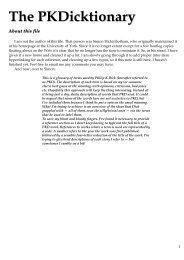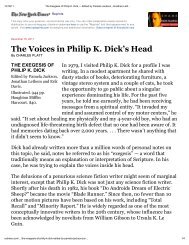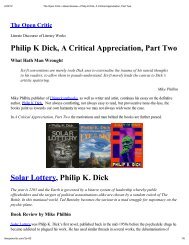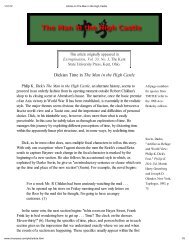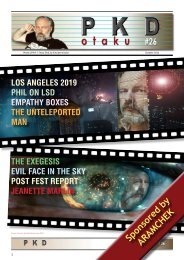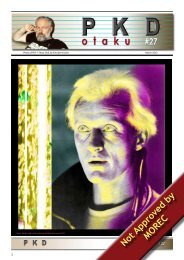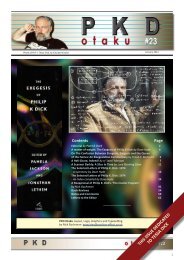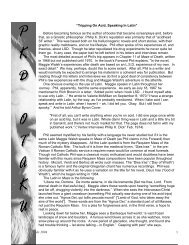Hermenaut - Philip K. Dick Fan Site
Hermenaut - Philip K. Dick Fan Site
Hermenaut - Philip K. Dick Fan Site
Create successful ePaper yourself
Turn your PDF publications into a flip-book with our unique Google optimized e-Paper software.
2/25/12 <strong>Hermenaut</strong>: <strong>Philip</strong> K. <strong>Dick</strong> | HiLobrow<br />
Browbeating<br />
Codebreaking<br />
Fiction<br />
Generations<br />
Haw-Haw<br />
HiLo Heroes<br />
Kudos<br />
Poetry<br />
Popular<br />
Radium Age SF<br />
Read-outs<br />
Spectacles<br />
Uncanny<br />
10.05.2011<br />
<strong>Hermenaut</strong>: <strong>Philip</strong> K. <strong>Dick</strong><br />
By: Joshua Glenn | Categories: Popular, Read-outs<br />
This article was first published in <strong>Hermenaut</strong> #15 (Summer 1999). <strong>Hermenaut</strong> was published and edited from 1991-2000 by<br />
HiLobrow cofounder Joshua Glenn. Click here to read more from <strong>Hermenaut</strong> and <strong>Hermenaut</strong>.com.<br />
<strong>Philip</strong> K. <strong>Dick</strong> in Gary Panter's ROZZ TOX MANIFESTO T-shirt<br />
<strong>Philip</strong> Kindred <strong>Dick</strong> and his twin sister Jane were born in Chicago — six weeks prematurely, on December 16, 1928 — to Edgar<br />
<strong>Dick</strong>, a livestock inspector for the U.S. Department of Agriculture, and his wife Dorothy. Jane died a few weeks later. Edgar was<br />
transferred to San Francisco the following year, but when he was transferred again in 1933, his wife Dorothy (a feminist and<br />
pacifist who felt at home in Berkeley) divorced him. <strong>Dick</strong> rarely saw his father (who went on to host a radio show in Los Angeles<br />
called “This Is Your Government”) again, and although throughout his life he was financially and emotionally dependent on his<br />
mother, he also deeply resented her… and was convinced she wanted to kill him.<br />
As an adolescent, not only was <strong>Dick</strong> asthmatic and overweight, he suffered from eczema and heart palpitations. His physical<br />
condition may help account for his early discovery within himself — while torturing a beetle, in the third grade — of a powerful<br />
capacity for empathy: with insects and animals at first, and eventually with weak and powerless human beings, too. He also<br />
immersed himself in the fantasy worlds of opera music, L. Frank Baum’s Oz books, and science fiction. (Although pseudoscientific<br />
adventure stories had existed at least since Verne and Wells, the term “science fiction” was coined shortly before <strong>Dick</strong><br />
was born by Hugo Gernsback, founder of Amazing Stories, the first sf pulp magazine.) Determined to be a writer, at nine <strong>Dick</strong><br />
wrote, edited, published, and drew cartoons for a short-lived broadside entitled The Daily <strong>Dick</strong>; at twelve he taught himself to<br />
type (he was eventually able to output 120 words per minute); and at fifteen he got his hands on a printing press and published a<br />
newspaper called The Truth. But he did not do well in high school: a self-diagnosed agoraphobic and “schizoid personality,” <strong>Dick</strong><br />
suffered attacks of vertigo, and dropped out in 1947.<br />
In his late teens, <strong>Dick</strong> worked for a radio, TV, and hi-fi sales/repair entrepreneur in Berkeley, from whom he acquired a high<br />
regard for do-it-yourself craftsmanship and a life of obstinate independence. Influenced by classical literature, experimental<br />
mainstream (as opposed to sf) fiction like that of Nathanael West and James Joyce, and esoteric philosophy, <strong>Dick</strong> tried to write<br />
fiction — which he hoped to sell to The New Yorker — but without success. In 1948, worried that he might be homosexual, he<br />
was briefly married. The following year, <strong>Dick</strong> enrolled at the University of California, Berkeley, as a philosophy major. However,<br />
although fascinated by his encounter with Plato’s theory that, as he later put it, “the empirical world [is] not truly real, at least not as<br />
real as the archetypal realm beyond it,” he dropped out almost immediately, and never went back.<br />
In 1950 <strong>Dick</strong> was married again, to an undergrad named Kleo, who supported him for eight years while he began writing for<br />
science fiction and fantasy pulps. He was desperate for work, but he was also motivated also by the possibilities of the genre. (In<br />
1953, he wrote “I became interested in writing [sf] when I saw it emerge from the ray gun stage into studies of man in various types<br />
and complexities of society.”) Typing furiously until four each morning, drinking scotch and popping prescription uppers, by 1958<br />
<strong>Dick</strong> had written and published over eighty science fiction and fantasy stories: thirty in ’53 alone, including “The Variable Man” (in<br />
hilobrow.com/2011/10/05/philip-k-dick/comment-page-1/#comment-94685<br />
1/10
2/25/12 <strong>Hermenaut</strong>: <strong>Philip</strong> K. <strong>Dick</strong> | HiLobrow<br />
which a humble handyman is caught up in a galactic power struggle), and “Imposter,” in which a robot thinks it’s human); and<br />
another twenty-eight the following year, including “Adjustment Team” (in which the protagonist discovers that the “ghosts” he sees<br />
are real, while he is not), and the deeply paranoid “Shell Game” (which became the novel Clans of the Alphane Moon). He<br />
continued to write short stories, off and on, for the rest of his life.<br />
This was hack writing, published with a minimum of editing; it didn’t pay well. <strong>Dick</strong> and his wife ate horse meat from the pet shop<br />
more than once during the early part of his career. It’s a (too-often made) mistake, though, to describe <strong>Dick</strong> as a “bad writer,” as<br />
though he were some naïve “outsider artist” in need of reclamation by sophisticated, tolerant readers. Vonnegut and Pynchon, for<br />
example, must be considered his disciples; and, although it’s a biographer’s duty to elevate his subject, Lawrence Sutin is not<br />
wrong to compare the black humor and intellectual daring of <strong>Dick</strong>’s parables and paradoxes to the writing of Kafka, Borges,<br />
Beckett, and Calvino. True, his prose can be uneven and even bathetic, but he learned his craft from the muscular style of the leftwing<br />
writers of the ’30s — particularly Dos Passos and Richard Wright — and the majority of his work is as passionate, complex,<br />
and hard-boiled as almost anything else published in his lifetime. Like Sartre before him (for example), <strong>Dick</strong> was a fictionalizing<br />
philosopher who combined in his writing abstract and generalized concepts with the immediacy of concrete, unique experiences:<br />
too concrete and unique, if anything, for the general public.<br />
It’s also wrong to claim, as so many of his critics have, that <strong>Dick</strong> was limited by the conventions of science fiction — which are<br />
contemptuously dismissed by <strong>Dick</strong>’s admirer, Polish sf novelist Stanislaw Lem as a “threadbare lot of telepaths, cosmic wars,<br />
parallel worlds, and time travel.” Interested, like Burroughs and Ballard, in exploding taken-for-granted notions — in his case,<br />
these include false oppositions like “true/false,” “real/illusion,” and “human/inhuman” — <strong>Dick</strong> can only have found sf’s avant-gardelike<br />
disregard for the realistic, referential constraints of New Yorker-style writing liberating. (He actually embraced the “trash”<br />
elements of the genre, insisting to Lem that “one must work with the trash, pit it against itself… If God manifested Himself to us<br />
here He would do so in the form of a spraycan advertised on TV.”) Despite his desire for mainstream recognition, <strong>Dick</strong> felt that sf<br />
was the perfect genre for his kind of writing, because its purpose is to “cut the reader loose from the actual world that he<br />
inhabits”… and, because sf fans already “have difficulty adjusting to the world,” they aren’t “hamstrung by middle-class prejudices<br />
and will listen to genuinely new ideas.”<br />
By the mid-’50s the pulp magazine boom was ending, and <strong>Dick</strong> switched to writing novels. In 1955, he wrote a mere twelve<br />
stories (including “Human Is,” about a woman who prefers her husband after he’s been possessed by an alien, and “Foster, You’re<br />
Dead,” in which the craze for bomb shelters is revealed to be a tool of social control), and sold his first novel — Solar Lottery,<br />
whose embattled hero is a humble “electronics repairman and human being with a conscience” — to Ace, a publisher of paperback<br />
originals. Spurred by slightly larger fees, <strong>Dick</strong> began to type faster and faster, pouring his pacifism (which was driven by his fear of<br />
nuclear disaster), his visceral dislike of ’50s-style paranoid politics (Kleo, a student activist, was visited by FBI agents more than<br />
once in those years; <strong>Dick</strong> claimed that he’d been instructed to spy on her), and his free-wheeling philosophical skepticism about the<br />
nature of reality into one far-fetched plot after another. In ’56 Ace published The World Jones Made and The Man Who Japed,<br />
which portrayed societies controlled by Nazi-like bureaucrats, industrialists, secret police forces, and mass media persuaders; ’57<br />
saw the publication of The Cosmic Puppets and Eye in the Sky, the latter a tragicomedy in which the chief of a missile lab<br />
struggles through a series of shared hallucinations triggered by an accident with a “Proton Beam Deflector.” Influenced by its<br />
author’s research into Hume, Jung, and the Buddhist concept of maya (world-as-illusion), Eye‘s working title was With Opened<br />
Mind; it posed a question which soon became central to <strong>Dick</strong>’s thinking: “What Is Real?”<br />
Discouraged by the fact that sf writing was dominated by “trolls and wackos” (he considered Robert Heinlein a fascist, though he<br />
borrowed money from him), <strong>Dick</strong> cranked out eight semi-surrealistic mainstream novels — about, for the most part, the unhappy<br />
domestic lives of TV salesmen — by the end of the decade, but couldn’t even get his own agent to read them. Although his wild<br />
anti-totalitarian tales were being translated for enthusiastic audiences in countries which understood such matters (Italy, West<br />
Germany, Japan, and particularly France-where, like Poe before him, <strong>Dick</strong> seemed a bohemian, dissident intellectual not taken in<br />
by the consensus illusion), in the U.S. <strong>Dick</strong> was trapped in the sf ghetto. He had great hopes, however, for the success of his novel<br />
Time Out of Joint (1959). The plot, about a creative type who realizes, when his sleepy 1958 town slowly begins to dissolve<br />
(literally) around him, that it’s actually 1994, and that a militaristic government is employing a large-scale illusion to keep him<br />
pacified, was too weird and subversive even for Ace. It was published by Lippincott as a “novel of menace,” and bombed.<br />
Uninterested in the self-congratulatory Beat scene in San Francisco, in ’58 <strong>Dick</strong> and his wife moved to the remote village of Point<br />
Reyes Station. There, he started an affair with Anne, the brilliant but unstable widow of one of the editors of Neurotica magazine.<br />
Divorcing Kleo, he married Anne and moved into her ultra-modern house, which became the setting of his great non-sf novel<br />
Confessions of A Crap Artist (w. 1959, p. 1975). Cramming his typewriter, books, hi-fi, records, comics, and pulp magazine<br />
collection into a shack down the road, <strong>Dick</strong> grew a beard, threw back enormous amounts of amphetamines, consulted the Bible<br />
and the I Ching regularly, and wrote faster than ever, producing eleven novels in 1963-’64 alone. Although he remained deeply<br />
concerned with social issues, <strong>Dick</strong> began now to turn increasingly away from specifically political concerns, and instead toward<br />
philosophical and religious questions; besides “What Is Real?” he became equally obsessed with the question “What Is Human?”<br />
hilobrow.com/2011/10/05/philip-k-dick/comment-page-1/#comment-94685<br />
2/10
2/25/12 <strong>Hermenaut</strong>: <strong>Philip</strong> K. <strong>Dick</strong> | HiLobrow<br />
Over the course of the ’60s <strong>Dick</strong> turned out all but a couple of those books on which (what passes for) his reputation rests today.<br />
Out-of-control potboilers like Dr. Futurity, Vulcan’s Hammer, The Crack In Space, The Penultimate Truth, The Zap Gun,<br />
The Unteleported Man, Counter-Clock World, The Ganymede Takeover, and Our Friends from Frolix 8 flew from his<br />
fingers almost as afterthoughts to wacked-out, sometimes astonishingly great works which treat — as one of <strong>Dick</strong>’s critics notes<br />
— ”ideas about politics, consciousness, reality, ethics, and love with an intensity of feeling, with comedy and sorrow, that was<br />
completely unprecedented in sf.” These include: We Can Build You (w. 1962, p. 1969), in which the brilliant but coldly schizoid<br />
Pris Frauenzimmer (based on <strong>Dick</strong>’s wife Anne) seems far less human than the engaging, depressed Abraham Lincoln simulacrum<br />
she helps design; The Man in the High Castle (w. 1961, p. 1962), which is set in an alternate universe where the Axis powers<br />
have won W.W.II, and which was written with the help of the I Ching; Martian Time-Slip (w. 1962, p. 1964), in which the Mars<br />
of hoary sf mythologizing becomes a Waste Land populated by visionary bushmen, a truth-telling ten-year-old schizophrenic, and a<br />
humble repairman who must put reality back together; Dr. Bloodmoney (w. 1963, p. 1965), a post-apocalyptic pastoral whose<br />
polyphonous narrative system and well-realized freakish characters almost gave neo-Marxist postmodernist literary critic Fredric<br />
Jameson a jouissance attack; The Game-Players of Titan (w. 1963, p. 1963), whose sf plot takes a back seat to psychological<br />
and metaphysical questions — and in which a man realizes that his psychiatrist is an alien; The Simulacra (w. 1963, p. 1964),<br />
about a future-world run by a seemingly immortal Jackie Onassis-like First Lady, her animatronic president-husbands, and their<br />
entertainment-conglomerate handlers; Now Wait For Last Year (w. 1963, p. 1966), in which an invasion of Nazi-like aliens is<br />
thwarted by an all-too-human world dictator; Clans of the Alphane Moon (w. 1963-64, p. 1964), which is set on an asylumworld<br />
organized into “clans” of madmen, and in which the virtue of caritas is preached by a Ganymedean slime mold; The Three<br />
Stigmata of Palmer Eldritch (w. 1964, p. 1965), through which the Gnostic idea that the world is the creation not of God, but of<br />
an evil, lesser deity, is burned forever into the reader’s mind via an inescapable odyssey of nested hallucinations — and which<br />
features a Martian colony whose settlers are addicted to an escapist Baywatch-type communal hallucination called “Perky Pat”;<br />
Do Androids Dream of Electric Sheep? (w. 1966, p. 1968), in which a professional android-hunter starts to wonder if he is an<br />
android; Ubik (w. 1966, p. 1969), a pataphysical grotesque set in the “half-life” of preserved dead people, which revisits the<br />
shared hallucinations of Eye in the Sky but offers none of that book’s answers — except in the form of salvation-in-a-spray-can<br />
(it’s been described as a piece of “guerrilla science fiction”); Galactic Pot-Healer (w. 1967-68, p. 1969), an ironic Jungian<br />
parable about a craftsman drafted by a semi-all-powerful alien to help raise a cathedral from the bottom of the ocean; and A Maze<br />
of Death (w. 1968, p. 1970), featuring a hair-raising series of shared hallucinations based on <strong>Dick</strong>’s one and only LSD trip. All at<br />
$1,500 a pop.<br />
Distraught at the lack of attention paid to High Castle (although its portrayal of the humanistic Japanese bureaucrat Mr. Tagomi<br />
helped it win sf’s Hugo Award in ’63, it was ignored by mainstream critics) and Time-Slip, which he considered to be<br />
masterpieces of an entirely new genre of fiction, and upset by his lack of earning power (compared to his wife), <strong>Dick</strong> had a nervous<br />
breakdown at the age of thirty-three. In ’64 he wrote, for an sf fanzine, the essay “Drugs, Hallucinations, and the Quest for<br />
Reality,” in which he proposed, à la Aldous Huxley, that “hallucinations, whether induced by psychosis, hypnosis, drugs, toxins,<br />
etc., may be merely quantitatively different from what we see, not qualitatively so,” i.e., that what we call “hallucinations” may in<br />
fact be the result of extremely sensitive perceptions that “sane” people have been taught to screen out of their consciousnesses.<br />
Like Baudelaire, whose rather scholarly mid-career writing on drugs gained him a lasting reputation as a wild-eyed degenerate, and<br />
despite his insistence that “one doesn’t have to depend on hallucinations; one can unhinge oneself by many other roads,” <strong>Dick</strong><br />
became an unwilling hero of the Californian subculture. Timothy Leary, John Lennon (who wanted to film Ubik), and cartoonist Art<br />
Spiegelman joined French intellectual pilgrims — one suspects that schizophrenia/”late capitalism” theorists Deleuze and Guattari<br />
were among them — in contacting <strong>Dick</strong> during this period.<br />
In 1963 <strong>Dick</strong> had his first, but not last, religious vision: He saw, in the sky, for several days in a row, an “horrifically evil metal<br />
visage” — which became the character Palmer Eldritch. Becoming more and more interested in Christianity, <strong>Dick</strong> befriended<br />
James Pike, the far-out Episcopalian Bishop of California; they swapped theories about the true origin of religion until Pike<br />
disappeared in 1969. Throughout the ’60s, <strong>Dick</strong> based all his decisions on the I Ching; his 1965 essay “Schizophrenia & The<br />
Book of Changes” discusses the reasons one should never do this. Although Palmer Eldritch was a breakthrough novel, of sorts<br />
— it was published in hardcover by Doubleday, and sold fairly well — <strong>Dick</strong> became increasingly wackier, believing that a) he was<br />
under constant surveillance (FBI? CIA? Nazis?), and b) the world was going to end soon. His marriage fell apart in 1964; he was<br />
married again by 1966.<br />
After writing the underrated Galactic Pot-Healer, which he felt was a bottom-of-the-barrel effort on his part, <strong>Dick</strong> drifted into a<br />
prolonged funk. He pitched ideas for original TV shows, and even suggested a plot for Mission Impossible, but without any luck.<br />
He continued to dose himself with whatever pills — uppers, downers, muscle relaxant — he could buy, or steal from friends’<br />
medicine cabinets; speed dealers and their clients used his suburban Los Angeles home as a clubhouse. Although he was more or<br />
less apolitical, he did sign an anti-Vietnam War petition pledging not to pay income taxes: The IRS seized his car. Then, in 1969,<br />
<strong>Dick</strong> took some shitty street speed, and was hospitalized for pancreatitis and acute kidney failure. The following year his fourth<br />
wife left him; he immediately invited his gun-toting drug buddies to move in with him. At forty-two, <strong>Dick</strong> had finally become the<br />
rootless, drug-addled bohemian everyone already imagined he was.<br />
hilobrow.com/2011/10/05/philip-k-dick/comment-page-1/#comment-94685<br />
3/10
2/25/12 <strong>Hermenaut</strong>: <strong>Philip</strong> K. <strong>Dick</strong> | HiLobrow<br />
Increasingly preoccupied, as one <strong>Dick</strong> exegete notes, “with solitary anxieties and by a corresponding concern with unexplainable<br />
ontological puzzles,” <strong>Dick</strong>’s books in the ’70s were infrequent (for him), and more explicitly autobiographical than what had come<br />
before — but they just kept getting better. Flow My Tears, The Policeman Said (w. 1970, p. 1974) is set in a Nixonian “betrayal<br />
state” of police spies, advanced surveillance techniques (bugs, sensors, minicams, even tattoos), and narcotic intrigue; it concerns a<br />
TV star who loses his identity in an alternate universe… but really, it’s a love story. To his skeptical colleagues, all this was almost<br />
too realistic to be considered science fiction; the book still won sf’s John W. Campbell Memorial Award, however. <strong>Dick</strong> didn’t<br />
write again for three years.<br />
Staying up for days at a time wearing the same wrinkled and filthy Nehru jacket, eating frozen chicken pot pies and drinking<br />
protein-fortified milkshakes, downing fistfuls of “white crosses” and blasting opera music (while he inhaled gruesome amounts of<br />
snuff), <strong>Dick</strong>’s world was restricted to bikers, drug addicts, and teenage girls. In 1971 he was admitted to a psychiatric hospital,<br />
because he wanted protection from the FBI (CIA?) agents who were tapping his phone and going through his papers. Shortly<br />
afterward, his house was in fact burglarized — which only confirmed his fear that one of his books had inadvertently revealed a<br />
government secret. (<strong>Dick</strong> was also fond of acting more crazy than he was; he enjoyed telling people, for example, that the cat’s<br />
litter box was bugged.) Eager to get away from his own life, in 1972 he accepted an invitation to attend a Vancouver sf convention<br />
as the guest of honor, and fled carrying nothing but a suitcase, a trenchcoat, and a Bible.<br />
At the convention, <strong>Dick</strong>’s speech “The Android and the Human,” a summation of “an entire life-time of developing thought,” was<br />
well-received; shortly afterward he took an overdose of sedatives in an attempt to kill himself. He recovered, and was taken to a<br />
rehab center, where — after twenty years — he finally kicked his amphetamine addiction. Back in California he met and married<br />
an eighteen-year-old college student named Tessa, who put up with his wild rages, his agoraphobia, and intermittent physical<br />
abuse; with her, he had his third and last child. Now <strong>Dick</strong> started writing again, about his life among the speed freaks, and the result<br />
was A Scanner Darkly (1977), one of the greatest works of 20th century fiction. Set in a barely futuristic suburban LA of 1994, it<br />
tells the story of “Fred,” a disillusioned narc who enjoys the company of the addicts with whom he lives as “Bob” — whose own<br />
drug intake contributes to a toxic brain psychosis complicated by Fred’s new assignment… to spy on Bob. The book ends with a<br />
dramatic dedication to <strong>Dick</strong>’s many friends who’d been killed or permanently damaged by drug abuse; his own name is on the list.<br />
That same year <strong>Dick</strong> wrote to the Department of Justice, offering his assistance in Nixon’s war on drugs, because “drug-abuse is<br />
the greatest problem I know of.” Shortly afterward, United Artists paid <strong>Dick</strong> $2,000 for the film rights to Electric Sheep; the novel<br />
was, of course, eventually made into the shallow action movie Blade Runner.<br />
On February 3rd, 1974, shortly before the publication of Flow My Tears, while <strong>Dick</strong> was recovering from the sodium pentothal<br />
he’d received during oral surgery, the doorbell rang. It was a delivery person, a young woman who happened to be wearing a gold<br />
icthus (a groovy ’70s Christian fish symbol) on a chain around her neck. Somehow the sight of the fish, plus his mental state at the<br />
time, plus the sodium pentothal, added up to a weeks-long flood of visions (<strong>Dick</strong> saw the Roman world of the Book of Acts<br />
stacked “holographically” atop the present), visual hallucinations (“It appeared — in vivid fire, with shining colors and balanced<br />
patterns — and released me from every thrall, inner and outer”), and a constant stream of cryptic messages (like “The Buddha is in<br />
the park”), often from the radio. Later, having studied Orphic, Gnostic, Zoroastrian, and Buddhist thought, books on brain<br />
chemistry, and the Encyclopedia of Philosophy, <strong>Dick</strong> decided that he’d probably experienced “genetic memories,” or what Plato<br />
called anamnesis — the “recollection” of eternal truths. Or something.<br />
After these experiences, as he noted in his Exegesis (a lengthy, handwritten journal devoted to theorizing about the events of “2-3-<br />
74″), he realized that the world really was “cardboard, a fake,” and that it was his duty to take on “in battle, as a champion of all<br />
human spirits in thrall, every evil, every Iron Imprisoning Thing.” Of course, as with his earlier paranoia about government<br />
surveillance, <strong>Dick</strong> also made fun of his own convictions: Although often frantic and miserable, the Exegesis has its amusing, selfparodistic<br />
moments: such as the essay in it entitled, in the voice of Ubik, “The Ultra Hidden (Cryptic) Doctrine: The Secret<br />
Meaning of the Great Systems of Theosophy of the World, Openly Revealed for the First Time.” Still not funny to <strong>Dick</strong>, however,<br />
was his fear of authority; in fact, he began to inform on his sf colleagues, accusing them of being part of a Communist conspiracy<br />
— led by Stanislaw Lem, his great admirer — to kidnap him. Typically, although he mailed some of these letters to the FBI (they<br />
were ignored), he put others in a trashcan behind his house, assuming that whomever was watching him would deliver them.<br />
Professionally speaking — that is, despite his failing health and obvious mental “issues” — 1975 was the greatest year of <strong>Dick</strong>’s<br />
life. A long interview with his friend and admirer Paul Williams appeared in Rolling Stone, and two short interviews with Tony Hiss<br />
appeared in The New Yorker (after twenty-five years of writing, he’d finally made it into that magazine’s light-hearted “Talk of the<br />
Town” section). Crap Artist was published, his first mainstream novel to see print, and that same year he wrote “Man, Android<br />
and Machine,” an essay which sums up his philosophical speculation on the question, “What is Human?” (and which then veers<br />
wildly across his speculations about “orthogonal time”). Also that year, the scholarly journal Science-Fiction Studies published a<br />
special issue devoted to his work; full of New Left and neo-Marxist analyses of <strong>Dick</strong>’s Laingian, existentialist, and anti-capitalist<br />
themes, it provoked even more unwelcome visits from French intellectuals — whom he drove away by blasting Linda Ronstadt at<br />
top volume, and whose words of praise he invariably reported to the authorities.<br />
hilobrow.com/2011/10/05/philip-k-dick/comment-page-1/#comment-94685<br />
4/10
2/25/12 <strong>Hermenaut</strong>: <strong>Philip</strong> K. <strong>Dick</strong> | HiLobrow<br />
In 1976 <strong>Dick</strong>’s fifth wife left him and he attempted suicide again, washing heart pills, high blood pressure pills, and antidepressants<br />
down with a bottle of wine, slashing his wrists, and locking himself into the garage with the car running. Somehow, he survived.<br />
Determined to get back to his old writing habits (his autobiographical essays from this period, like “The Short, Happy Life of a<br />
Science Fiction Writer,” cry out with money complaints), <strong>Dick</strong> typed eighteen hours a day, in an attempt to explore his 2-3-74<br />
experiences through the medium of the novel. In the semi-autobiographical novels Radio Free Albemuth (w. 1976, p. 1985) and<br />
Valis (w. 1978, p. 1981) — the latter is about a crackpot named Horselover Fat, and is narrated by Fat’s friend, a character in<br />
the book named “Phil <strong>Dick</strong>,” who writes sf novels… and who reveals that he is Fat — <strong>Dick</strong> gave free rein to his growing suspicion<br />
that everything he’d ever invented in his books was true. In addition, <strong>Dick</strong> revealed that Richard Nixon was the leader of an evil<br />
empire (a “matrix” including Rome, the Third Reich, and the USSR) that had never ended, and that VALIS (a “Vast Active Living<br />
Intelligence System” which might be God, an alien intelligence, or technology from the future) was beaming knowledge of all this<br />
directly into his mind.<br />
In 1977, <strong>Dick</strong> gave a long keynote speech at an sf conference in France. Entitled “If You Find This World Bad, You Should See<br />
Some of the Others,” it combines <strong>Dick</strong>’s theory of orthogonal time with a confession that High Castle and Flow My Tears were<br />
based on his own fragmentary residual memories of an alternate slave state/world; people left the auditorium, it was later reported,<br />
looking as though they’d been hit with a hammer. The following year he wrote “Cosmogony and Cosmology,” a summary of the<br />
key insights in the Exegesis (the world is an illusion, projected by a demiurge, from which we must learn to break free); shortly<br />
afterwards he wrote “How to Build a Universe That Doesn’t Fall Apart Two Days Later,” a never-delivered speech which<br />
playfully summarizes the same theories.<br />
As the Reagan era began, <strong>Dick</strong> wrote The Divine Invasion (p. 1981), a Gnostic adventure about an alien named Yah who sends<br />
a divine child to bring truth and meaning to our occluded world. (He planned to do a follow-up book about present-day “secret<br />
Christians” fighting against the hidden evil Empire, but never got to it.) The following year, as Blade Runner neared completion,<br />
<strong>Dick</strong> was offered a $250,000 bribe — the Harrison Ford-starring movie was supposed to be the next Star Wars — to suppress<br />
the original version of Electric Sheep in favor of a novelization based on the (vastly inferior) screenplay. He was ready to<br />
negotiate; his agent talked him out of it; they compromised by changing the name of the novel to Blade Runner. <strong>Dick</strong> then turned<br />
his attention to The Transmigration of Timothy Archer (w. 1981, p. 1982), a tribute to his friend Bishop Pike and the final book<br />
in the Valis trilogy.<br />
Noting in his Exegesis that he didn’t have long to live, <strong>Dick</strong> planned a novel to be called The Owl in Daylight, about an evolved<br />
person in whom all prior (and contradictory) forms of divine wisdom are unified, but never started writing it. Early in 1982, he reproposed<br />
to Tessa, and she accepted. However, after attending the opening of Blade Runner, <strong>Dick</strong> suffered a stroke. He died<br />
shortly thereafter, on March 2nd, at the age of fifty-three.<br />
How Shall We Understand?<br />
“My books (& stories) are intellectual (conceptual) mazes & I am in an intellectual maze in trying to figure out our<br />
situation (who we are & how we look into the world, & world as illusion, etc.) because the situation is a maze.”<br />
— <strong>Dick</strong>, from his Exegesis<br />
Stanislaw Lem, the first critic to take <strong>Dick</strong> seriously as a religious writer, writes that in <strong>Dick</strong>’s books “monstrous” metaphysical<br />
dilemmas “go out into the street and become for every ordinary mortal [a] burning question.” Anyone who’s read half-a-dozen of<br />
<strong>Dick</strong>’s books in a short period of time knows how nauseatingly disorienting an experience that can be; as one critic puts it, he<br />
mixes and matches “metaphysical, ontological, anthropological, epistemological, ethical preoccupations with the nature of reality,<br />
appearances, knowledge and perception, the authentically human and the artificial, the everyday and the political, the existential and<br />
transcendent, the hopeful and the dystopian, the affirmative and entropic.” In a 1969 interview <strong>Dick</strong> praises science fiction because,<br />
he says, it presents its readers with “a great range of ‘as if’ views: The possession of these have the effect of making our minds<br />
flexible.” In <strong>Dick</strong>’s case, most readers would agree, this side-effect may have worked too well.<br />
It may be a ridiculous idea, “explaining” <strong>Dick</strong>’s thought — as expressed through his novels and stories, essays and speeches,<br />
interviews and Exegesis entries — because his point is always to estrange not just his readers, but himself. (That’s why when <strong>Dick</strong><br />
tries, in the Exegesis and his speeches, to explain his “philosophy” it so often seems both banal and insane.) It’s important to<br />
understand that <strong>Dick</strong> was — if not necessarily mentally ill, as he sometimes claimed — a profoundly discouraged and melancholy<br />
man, who didn’t always believe that there were any solutions to the scenes of metaphysical vertigo and political-psychological<br />
repression in his writing. The title character of The Three Stigmata of Palmer Eldritch, an evil demiurge with brings to mankind a<br />
“negative trinity” of “alienation, blurred reality, and despair,” seems to have made his first stop at <strong>Dick</strong>’s house.<br />
But, as <strong>Dick</strong> writes, “I think I understand the common ingredient in those whom my writing helps: They cannot or will not blunt their<br />
own intimations about the irrational, mysterious nature of reality, &, for them, my corpus of writing is one long ratiocination<br />
regarding this inexplicable reality, an integration & presentation, analysis & response & personal history.” This excellent description<br />
hilobrow.com/2011/10/05/philip-k-dick/comment-page-1/#comment-94685<br />
5/10
2/25/12 <strong>Hermenaut</strong>: <strong>Philip</strong> K. <strong>Dick</strong> | HiLobrow<br />
of his own writing contains, I think, the key to <strong>Dick</strong>’s thought: We may well be helpless to change anything — since we can’t even<br />
know for sure if the world we perceive is real — but we must continue to struggle against the normalizing effect of the status quo.<br />
As <strong>Dick</strong> notes in his Exegesis, “my writing deals with hallucinated worlds, intoxicating & deluding drugs, & psychosis. But my<br />
writing acts as an antidote — a detoxifying — not intoxicating — antidote.” Like the bumbling, solitary, cranky repairmen and<br />
artisans in <strong>Dick</strong>’s novels, we, his readers, become “unhinged,” and cannot return to “standard reality-convictions.” <strong>Dick</strong> inspires us,<br />
to paraphrase his biographer Lawrence Sutin, to take the all-important first step — not toward truth, but toward the fact of our<br />
own ignorance.<br />
<strong>Dick</strong> is not, in the final analysis, a philosopher — not in the sense of a metaphysician, anyway, or someone believes that all<br />
questions can be resolved into one perfect system. He is, instead, what one critic calls “a prophet of hyperreality, a beleaguered<br />
and heroic humanist, a Gnostic visionary of the suburbs.” What passes for <strong>Dick</strong>’s “philosophy” is nothing but a fragmented and<br />
entirely personal collection of theories, which he arranges and re-arranges obsessively, without — however — ever really believing<br />
they will all some day fit together. What has been described, pejoratively, as “the fundamental ambivalence of <strong>Dick</strong>’s imagination”<br />
is, it seems to me, a positive attribute: We are compelled, by his principled refusal, or abject inability, to provide us with any<br />
answers to the de-stabilizing questions he poses, to remain ironically and radically suspicious of all received forms and norms, and<br />
to creatively live the tension of human reality in all its contingency, ambiguity, and absurdity.<br />
How Shall We Be?<br />
“My grand theme: Who is human and who only appears (masquerades) as human?” — <strong>Dick</strong>, commenting on his<br />
story “Second Variety” (1976).<br />
In 1964, the very year <strong>Dick</strong> was writing The Three Stigmata of Palmer Eldritch, about a drug baron who voluntarily becomes a<br />
machine (the three “stigmata” of the title are his new mechanical prostheses) in order to gain ultimate power, T.W. Adorno wrote<br />
that the pseudo-existentialist “jargon of authenticity” — which was then being eagerly embraced by German bureaucrats eager to<br />
seem less inhuman — involves “the apparent humanization of the thingly,” which in turn merely serves as a camouflage for “the<br />
actual turning of man into thing.” Unlike many intellectuals in the ’60s, who prophesied an Age of Aquarius in which man would<br />
reach his full potential, and in which humanistic values would triumph over the technocratic militarism of previous decades, <strong>Dick</strong><br />
and Adorno agreed that even as technology was becoming more and more “user-friendly,” people were becoming not more, but<br />
less human all the time.<br />
In “The Android and the Human,” <strong>Dick</strong>’s speech about androids, robots, and simulacra (words he uses interchangeably for<br />
“artificial constructs masquerading as humans”), he describes these “fierce cold things” not as machines, but as “sly and cruel<br />
entities that smile as they reach out to shake hands… but their handshake is the grip of death, and their smile has the coldness of<br />
the grave.” Androids are not, he argues, different in their essence from humans — just in their behavior. For <strong>Dick</strong>, whose Exegesis<br />
notes that, thanks to the experience of 2-3-74, he’d finally started living the satori he experienced as a child torturing a beetle, the<br />
answer to the question “What is Human?” is: kindness, empathy. That’s why it doesn’t matter, to <strong>Dick</strong>, that those mechanical<br />
systems in his stories and novels that display kindness — like the automated taxicab that counsels the protagonist of The Game-<br />
Players of Titan not to leave his wife — are programmed to act human; if they act human, they are human. The converse is also<br />
true: A sly and cruel human being without empathy, without caritas, who “stands detached, a spectator,” is — <strong>Dick</strong> insists — no<br />
kind of a human at all.<br />
“The greatest change growing across our world these days is probably the momentum of the living toward reification,” <strong>Dick</strong> writes<br />
a couple of years later, in “Man, Android, and Machine.” How does this happen? In his earlier speech, <strong>Dick</strong> makes a Heideggerian<br />
argument that humans can actually be transformed into machines, by being “pounded down, manipulated, made into a means<br />
[rather than an end] without one’s knowledge or consent.” The “androidization” of humans, he warns, “has become a science of<br />
government and suchlike agencies now [using, he specifically mentions, "pacification drugs" like anti-depressants and tranquilizers,<br />
which transform a person who feels "wild grief, anger, fear, and all intense feelings" into someone who is "stable, predictable, not a<br />
menace to others"]… until a time will perhaps come when a writer, for example, will not stop writing because someone unplugged<br />
his electric typewriter but because someone unplugged him.”<br />
All of which helps explain the strange pseudo-religion called “Mercerism,” in Do Androids Dream of Electric Sheep? — in which<br />
grasping the handles of an electronic “empathy box” allows one to “encompass every other living thing.” One of <strong>Dick</strong>’s best books<br />
(despite the fact that it almost never appears on any lists of his “classic” novels), Electric Sheep is not, as in the film version,<br />
primarily an adventure story, nor is it primarily a dystopian view of future urban life, nor even a metaphor for man’s ambivalent<br />
relationship with technology. What the book is about is the human quality of empathy. The androids have no emotions — the only<br />
way that Deckard, the android hunter, can tell them apart from humans is by giving them “empathy tests” — and they’re out to<br />
prove that “Mercerism is a swindle… The whole experience of empathy is a swindle.” Deckard’s real task (which Harrison Ford<br />
couldn’t have pulled off even if it had been in the script) is to prove them wrong.<br />
hilobrow.com/2011/10/05/philip-k-dick/comment-page-1/#comment-94685<br />
6/10
2/25/12 <strong>Hermenaut</strong>: <strong>Philip</strong> K. <strong>Dick</strong> | HiLobrow<br />
<strong>Dick</strong>’s certainty that empathy and kindness can triumph over even the most insidious entertainment-enforced normality is also the<br />
theme of Flow My Tears, which explores the “subtle, intricate relationships which exist between the sexes” — in this case,<br />
between General Felix Buckman and his bisexual leather-queen twin-sister/wife — and which ends with Buckman crying over her<br />
death, and being embraced by a total stranger. In a 1970 letter to a friend about Flow My Tears, <strong>Dick</strong> writes, “In answer to the<br />
question, ‘what is real?’ the answer is: this kind of overpowering love.” For <strong>Dick</strong>, in a world where we’re all becoming<br />
androidized, acts of unselfish kindness are the only remaining proof of one’s humanity.<br />
What Shall We Believe?<br />
“What I write doesn’t make a whole lot of sense… I certainly see the randomness in my work, & I also see how this<br />
fast shuffling of possibility after possibility might eventually, given enough time, juxtapose & disclose something<br />
important & automatically overlooked in more orderly thinking… Anyone with my attitude just might stumble onto, by<br />
sheer chance & luck… the authentic camouflaged God… might catch him by surprise by poking somewhere<br />
unexpectedly.” — <strong>Dick</strong>, from his Exegesis.<br />
The narrator of Valis (Phil <strong>Dick</strong>/Horselover Fat) wryly observes that “Fat must have come up with more theories than there are<br />
stars in the universe. Every day he developed a new one, more cunning, more exciting, and more fucked.” <strong>Dick</strong> was, of course,<br />
talking about himself. Like Fat’s “Tractates Cryptica Scriptura,” parts of which were beamed directly into the author’s (<strong>Dick</strong>’s)<br />
brain, the Exegesis is a collage of-among other influences — Plato, Parmenides, Ikhnaton, Bruno, Paracelsus, the Rosicrucians,<br />
and The Tibetan Book of the Dead. But although <strong>Dick</strong> proves himself a masterful synthesizer, in “The Android and the Human,” he<br />
rejects all systems of explanation, and system-building in general; suggesting that instead “we should be content with the mysterious,<br />
the meaningless, the contradictory, the hostile, and most of all the unexplainably warm and giving.”<br />
It’s easy to be content with the unexplainably warm and giving, one imagines. More often, however, <strong>Dick</strong>’s protagonists discover<br />
that the world is a mysterious, meaningless, contradictory, and hostile place in which they must struggle towards truth, meaning,<br />
reality. After Eye in the Sky, they never arrive at those destinations… because they just aren’t there. In “How to Build a Universe<br />
That Doesn’t Fall Apart Two Days Later,” <strong>Dick</strong> confesses “I like to build universes that do fall apart” — because “objects,<br />
customs, habits, and ways of life must perish so that the authentic human being can live. And it is the authentic human being who<br />
matters most, the viable, elastic organism that can bounce back, absorb, and deal with the new.” That’s an odd word for <strong>Dick</strong> to<br />
use: authentic. But it seems like he means it not in the essentialist, but in the existential sense — to mean an ironist who is skeptical<br />
of all forms and norms, but who’s also able to creatively invent his or her own.<br />
Why should we be skeptical of the real? <strong>Dick</strong> votary Jean Baudrillard has said recently that “the real is what one must not consent<br />
to… Let’s never forget that the real is merely a simulation, a model for regulating and ordering the radical becoming, the radical<br />
illusion, of the world and its appearances; for reducing any internal singularity-of events, beings or things-to the common<br />
denominator of reality.” For <strong>Dick</strong>, then, what’s “real” is a simulation, a replica which has replaced that real which cannot be<br />
regulated, ordered, or reduced by any philosophy, any theory, any narrative. In Ubik (for which <strong>Dick</strong> was elected as an honorary<br />
member of France’s Jarry-inspired Collège du Pataphysique), an explosion hurls Joe Chip and his colleagues into an irreal, everchanging<br />
world — which may or may not be a hallucination, or a kind of “half-life” (if they’re dead, that is), and which frustrates<br />
every interpretation they posit, every attempt to make their experience a meaningful one. After a false ending, which seems to<br />
explain everything, a final plot twist suggests that this conclusion, too, is merely an interpretation: “This was just the beginning,”<br />
reads the final line.<br />
For <strong>Dick</strong>, all facts must be dynamited free from the banal, oppressive systems which bind them, and put back into play. For this<br />
difficult task, paranoia comes in handy. “I’m out of step. I should yield to reality. I have never yielded to reality. That’s what sf is all<br />
about,” reads the preface to The Golden Man (1980) a collection of <strong>Dick</strong>’s stories. The paranoid, like Mr. Tagomi in High<br />
Castle, takes nothing for granted, and knows that “We’re blind moles. Creeping through the soil, feeling with our snoots. We<br />
know nothing.” But paranoia, as <strong>Dick</strong> acknowledges in “The Android and the Human,” is itself a form of system-building, in which<br />
our daily experiences seem to take on an intelligibility, a symmetrical totality which simply is not there. “Maybe all systems — that<br />
is, any theoretical, verbal, symbolic, semantic, etc., formulation that attempts to act as an all-encompassing, all-explaining<br />
hypothesis of what the universe is about—,” he muses, “are manifestations of paranoia.” (This, I think, is where Thomas Pynchon<br />
got the line about paranoia and religion being alike, because they both seem to connect everything.) What comes after paranoia,<br />
then, for <strong>Dick</strong>?<br />
Two words: the void. In a 1970 letter to Commentary, <strong>Dick</strong> writes that “For me, in each successive novel, the doubt — or rather<br />
lack of trust or faith — grows deeper. The split widens, that yawning gap in the earth, into which everything that matters can fall.”<br />
This language echoes that of Martian Time-Slip, in which the ten-year-old schizophrenic Manfred sees “a hole as large as a world;<br />
the earth disappeared and became black, empty, and nothing… Into the hole the men jumped one by one, until none of them were<br />
left. He was alone, with the silent world-hole.” The void, for <strong>Dick</strong>, is the all-consuming recognition that the world is never anything<br />
more than a shared hallucination generated by an atomic catastrophe, or by an potent dose of alien psychoactive drugs, or the<br />
hilobrow.com/2011/10/05/philip-k-dick/comment-page-1/#comment-94685<br />
7/10
2/25/12 <strong>Hermenaut</strong>: <strong>Philip</strong> K. <strong>Dick</strong> | HiLobrow<br />
flawed creation of an evil demiurge. Ours is an occluded existence, whose true reality is obscured by, among other things,<br />
“spurious memories & hallucinated (irreal) worlds.” The recent <strong>Dick</strong> rip-off movie The Truman Show ends with Jim Carrey<br />
stepping through the illusionary horizon into the real world, but for <strong>Dick</strong> this kind of happy ending is never an option. There is no<br />
reality behind the irreal.<br />
How, then, can the authentic person “bounce back, absorb, and deal with” the ever-new which for <strong>Dick</strong> is reality? “Reality, to me,<br />
is not so much something that you perceive, but something you make,” he says in “The Android and the Human.” Not make as in<br />
“make into a system” — what <strong>Dick</strong> means is that reality (as opposed to the irreality which passes for reality) is always something<br />
that is in the making, by us. The real arises in the making of the real, in the constant “fast shuffling of possibility after possibility.”<br />
Truth is not hidden, for us to discover, according to “The Android and the Human” — it’s “what you do with the bits and pieces of<br />
meaningless, puzzling, disappointing, even cruel and crushing fragments all around us that seem to be pieces left over, discarded,<br />
from another world entirely that did, maybe, make sense.”<br />
This explains why the humble heroes of so many of <strong>Dick</strong>’s books are artificers, “variable” men, and repairmen: They are all, in their<br />
humble way, creators and not destroyers. This also, I think, explains <strong>Dick</strong>’s defense of trash (to Lem, above), his late-’60s boast<br />
that he was spending “most of [my] time listening to first Scarlatti and then the Jefferson Airplane and the Gotterdämmerung, in an<br />
attempt to fit them all together,” and the final paragraph of Valis, in which the narrator (<strong>Dick</strong>) stations himself in front of the TV,<br />
waiting for a sign. Reality may be just a simulation, but the “fake” — the flotsam and jetsam of pop culture — may turn out to be<br />
the bricks and mortar with which we can construct our own reality.<br />
What Shall We Do?<br />
“I mean, after all, you have to consider, we’re only made of dust. That’s admittedly not much to go on and we<br />
shouldn’t forget that. But even considering… we’re not doing too bad. So I personally have faith that even in this<br />
lousy situation we’re faced with we can make it. You get me?” — interoffice memo from Barney Mayerson, in The<br />
Three Stigmata of Palmer Eldritch (1965)<br />
<strong>Dick</strong> writes, about the above memo, that he wrote Palmer Eldritch for no other reason than to provide background context for<br />
this, his statement of faith “not so much in God, either a good god or a bad god or both-but in ourselves.” Which is great, and<br />
everything… but if the answer to “What is Real?” is “Nothing, except what we make ourselves,” how are we supposed to<br />
proceed? We already know, of course, that (as he says in his Afterword to The Golden Man) <strong>Dick</strong>’s “anger is generated out of<br />
love; it is love baffled,” and that for <strong>Dick</strong> the little virtues — “love, making exceptions, humor, determination” — are vital, but once<br />
we’ve become lucidly aware of the irreality in which we live, how can we move from empathy to action?<br />
In his 1974 essay “Who Is an SF Writer?” <strong>Dick</strong> suggests that “the sf writer is able to dissolve the normal absolute quality that the<br />
objects (our actual environment, our daily routine) have; he has cut us loose enough to put us in a third space, neither the concrete<br />
nor the abstract, but something unique, something connected to both and hence relevant… the daily tyranny of our immediate<br />
world, which we generally succumb to, becoming passive in the hands of and accepting as immutable, this is broken, this tyranny of<br />
concrete reality.” For <strong>Dick</strong>, despite the fact that the “normal absolute” reality is not as concrete as it seems, the passivity of nihilism<br />
is not acceptable; in fact, waking up to irreality is energizing. This is the other central theme of Electric Sheep (and Martian Time-<br />
Slip, and The Penultimate Truth, among others): Never surrender. “I can’t stand the way you androids give up,” Deckard tells<br />
the android Rachel, who passively waits for him to kill her — why wasn’t this scene in the movie?<br />
Besides empathy, then, for <strong>Dick</strong> a cranky stubbornness is the most vital quality a person can have. In a 1970 letter, <strong>Dick</strong> writes<br />
that “I know only one thing about my novels. In them again and again, this minor man asserts himself in all his hasty, sweaty<br />
strength… Perhaps [my critics] are bothered by the fact that what I trust is so very small. They want something vaster. I have news<br />
for them: there is nothing vaster.” The humble pot-healers, doctors, musical instrument-makers, and tire re-treaders of <strong>Dick</strong>’s<br />
stories are survivors, heroes-as-failures, “the guy who has to pick up the tab.” Unable to manage their own lives (Joe Chip, in<br />
Ubik, is threatened with a lawsuit by his own front door, to whom he owes money), their very inertia often becomes a form of<br />
heroism. Unlike Arnold Schwarzenegger in Total Recall — which is based on the 1966 <strong>Dick</strong> story “We Can Remember It For<br />
You Wholesale” — who instantly goes from being Joe Lunchpail to, well, Arnold Schwarzenegger, heroism for <strong>Dick</strong> is expressed<br />
by a schlemiel like Barney Mayerson, in Palmer Eldritch, who decides to stay on in the mind-numbing Martian colony, to “work<br />
on my garden up top and whatever else they do. Build irrigation systems and like that.” This sums up <strong>Dick</strong>’s mid-’60s notion of<br />
Right Action.<br />
Later, however, <strong>Dick</strong>’s view of post-metaphysical-apocalypse Right Action became more complicated. <strong>Dick</strong>’s portrait of a future<br />
(present?) in which anyone who attempts to resist capitalism, authoritarianism, or normality in general is enveloped in a net of<br />
hallucinations is a vision of hell, one in which all taken-for-granted notions of good and evil are destroyed. “We do not have the<br />
ideal world such as we should like, where morality is easy because cognition is easy,” Mr. Tagomi says in High Castle; in fact, as<br />
faux-Christ Wilbur Mercer tells Deckard in Electric Sheep, “You will be required to do wrong no matter where you go. It is the<br />
hilobrow.com/2011/10/05/philip-k-dick/comment-page-1/#comment-94685<br />
8/10
2/25/12 <strong>Hermenaut</strong>: <strong>Philip</strong> K. <strong>Dick</strong> | HiLobrow<br />
basic condition of life.” For the later, Gnostic <strong>Dick</strong>, the world is a creation of an evil deity, entropy (“gubble,” in Martian Time-<br />
Slip) is on the loose, and we are all becoming cold machines with smiles of death plastered on our faces. What, then, to do?<br />
In “The Android and the Human,” <strong>Dick</strong> suggests that the young sociopaths with whom he was in those days spending all his time<br />
had provided him with an answer. Their criminal perversity and willfulness, he writes, are guarantors that they will never be<br />
“unplugged,” because they’d never allow themselves to become plugged-in in the first place. “If, as it seems, we are in the process<br />
of becoming a totalitarian society,” he concludes, “the thing would be: cheat, lie, evade, fake it, be elsewhere, forge documents,<br />
build improved electronic gadgets in your garage that’ll outwit the gadgets used by the authorities.” Why? Because “even the most<br />
base schemes of human beings are preferable to the most exalted tropisms of machines” (which substitute means for ends), and<br />
because “we can tell and tell [people like that] what to do, but when the time comes for him to perform, all the subliminal<br />
instruction, all the ideological briefing, all the tranquilizing drugs, all the psychotherapy are a waste. He just plain will not jump when<br />
the whip is cracked.” This, for <strong>Dick</strong>, is what passes for a vision of the Good.<br />
***<br />
READ MORE essays by Joshua Glenn, originally published in: THE BAFFLER | BOSTON GLOBE IDEAS | BRAINIAC |<br />
CABINET | FEED | HERMENAUT | HILOBROW | HILOBROW: GENERATIONS | HILOBROW: RADIUM-AGE<br />
SCIENCE FICTION | HILOBROW: SHOCKING BLOCKING | THE IDLER | IO9 | N+1 | NEW YORK TIMES<br />
BOOK REVIEW | SEMIONAUT | SLATE<br />
Joshua Glenn’s most recent book is The Wage Slave’s Glossary, co-authored with Mark Kingwell and illustrated by Seth.<br />
Like<br />
70<br />
people<br />
Categories: Popular, Read-outs - Tags: <strong>Hermenaut</strong>, hermenaut-josh, Jean Baudrillard, longreads, <strong>Philip</strong> K. <strong>Dick</strong>, sf<br />
MORE POSTS by Joshua Glenn<br />
Joshua Glenn is an editor, publisher, and a freelance writer and semiologist. He does business as KING MIXER, LLC. He's<br />
cofounder of the websites HiLobrow, Significant Objects, and Semionaut; and cofounder of HiLoBooks, which will reissue six<br />
Radium Age sci fi novels in 2012. In 2011, he produced and co-designed the iPhone app KER-PUNCH. He's coauthored and<br />
co-edited TAKING THINGS SERIOUSLY, THE IDLER'S GLOSSARY, THE WAGE SLAVE'S GLOSSARY, the<br />
story collection SIGNIFICANT OBJECTS (forthcoming from <strong>Fan</strong>tagraphics), and the kids' field guide to life UNBORED,<br />
forthcoming from Bloomsbury. In the '00s, Glenn was an editor and columnist at the Boston Globe's IDEAS section; he started<br />
the IDEAS blog Brainiac. In the '90s, he published the seminal intellectual zine <strong>Hermenaut</strong>; co-directed the DIY social<br />
networking site Tripod.com; and was an editor at Utne Reader. He has written frequently for Slate, n+1, Cabinet, io9, The<br />
Baffler, Feed, and The Idler. Glenn manages the secret society <strong>Hermenaut</strong>ic Circle. He was born and raised in Boston, where<br />
he lives with his wife and sons. Click here for more info.<br />
5 Comments to “<strong>Hermenaut</strong>: <strong>Philip</strong> K. <strong>Dick</strong>”<br />
1. kirk says:<br />
October 5, 2011 at 4:31 pm<br />
I was reading PKD in real time in the 70′s and totally got the subversion but was only able to skim the weird visions and<br />
hallucinations. I had not taken the right drugs yet. I started rereading the canon after St. Richard Linklater’s A Scanner<br />
Darkly came out. Thanks for this piece. Thanks a million.<br />
2. Klaus Rother says:<br />
October 5, 2011 at 9:59 pm<br />
Fucking awesome.<br />
3. simon50 says:<br />
October 5, 2011 at 10:21 pm<br />
hilobrow.com/2011/10/05/philip-k-dick/comment-page-1/#comment-94685<br />
9/10
2/25/12 <strong>Hermenaut</strong>: <strong>Philip</strong> K. <strong>Dick</strong> | HiLobrow<br />
Great article!<br />
I hope all my fellow PKD fans will check out the new indie movie version of Radio Free Albemuth that I adapted and<br />
directed. PKD scholar David Gill’s website Total <strong>Dick</strong>head has given a full-throated endorsement – also Gabriel McKee<br />
(who helped edit the forthcoming Exegesis). Please “like” RFA on Facebook – Radio Free Albemuth-Movie and join the<br />
mailing list of http://www.radiofreealbemuth.com for updates. Variety just gave excellent review – ” Engrossing<br />
adaptation”<br />
“Well-performed.”<br />
“Should connect strongly with <strong>Dick</strong>’s fanbase and attract upscale auds seeking sci-fi with political and philosophical<br />
substance”<br />
“Consistently absorbing.”<br />
“the narrative delivers satisfying intrigue and suspense”<br />
“Pic operates successfully as a study of enlightenment and a straight-ahead conspiracy thriller.”<br />
I can be reached through the website or our Facebook page.<br />
4. Greg Lee says:<br />
January 25, 2012 at 3:19 pm<br />
Hi Joshua,<br />
Great piece…for those of us who don’t “tweet” or “facebook”, how do I get updates on when your Radium Age books will<br />
actually be published…2012 is a little vague.<br />
Bright moments,<br />
Greg<br />
5. Joshua Glenn says:<br />
January 25, 2012 at 3:53 pm<br />
Thanks, Greg. All info will be posted here:<br />
http://hilobrow.com/hilobooks/<br />
©2009-2011 HiLobrow<br />
Middlebrow is not the solution<br />
hilobrow.com/2011/10/05/philip-k-dick/comment-page-1/#comment-94685<br />
10/10


